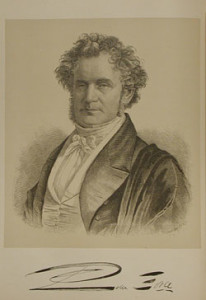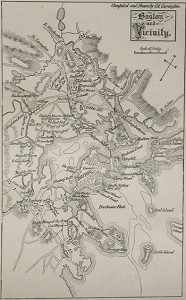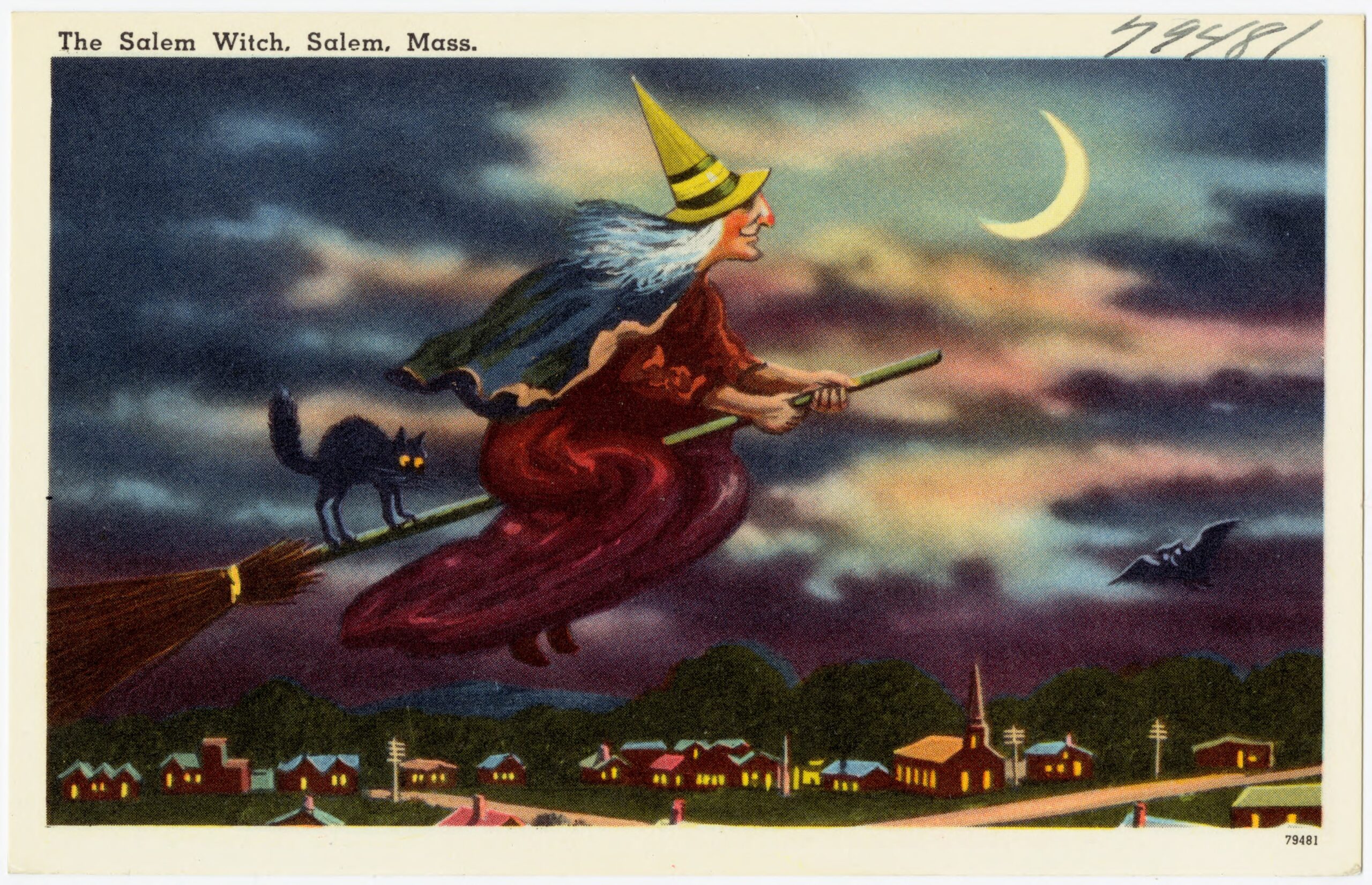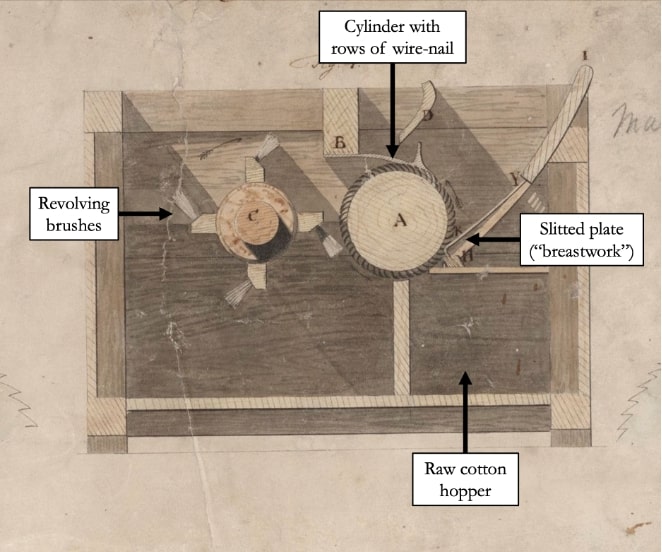A new way to find out
The sad story of Dr. Benjamin Church is one of the forgotten tales of the Revolutionary War. The William L. Clements Library, one of the foremost repositories of materials on the Revolution, calls Church a traitor. Church, the library relates on its Website, belonged to “both the Provincial Congress of Massachusetts and . . . the Sons of Liberty.” But he “was really a paid spy for the British general, Sir Thomas Gage. Six weeks before the battle of Lexington, Church sent Gage letters detailing hidden military and political secrets of the American rebel forces . . . In October of 1775, one of Church’s spy letters to Gage was captured and delivered to General Washington. Church was arrested, stood trial for treason and imprisoned until 1777. After his release, Church sailed to the West Indies in a schooner that disappeared at sea.”
Historians have long agreed that Dr. Church committed treason. Nearly three-quarters of a century ago, Allen French appeared to have closed the case against Dr. Church in his book General Gage’s Informers, the source of most later accounts. French reviews the evidence against Dr. Church: Paul Revere’s reminiscences of Church’s treasonous activities; Church’s appearance in Boston during the siege, when patriots had left; his exemplary performance as director of the Continental Army hospital; and the captured letter and the patriots’ response to it. French discovered letters, in several hands, in the Thomas Gage Papers at the Clements Library that proved to be from Church to British General Gage. French’s opinion, after sifting the evidence, is clear: Church “deserved his sentence,” and “it is impossible to frame an excuse for him.”
For more than half a century, all authorities have accepted French’s conclusion. The Dictionary of American Biography (1937) adds damning details of duplicity and double-dealing. He wrote patriot tracts—and answered them in Loyalist journals. He drafted letters for the Boston Committee of Correspondence—but supplied intelligence to Governor Hutchinson and General Gage.
The most thorough short biographical account is in the online subscription database American National Biography Online, by Edward W. Hanson. It deems Church a “physician, poet, and traitor” but raises questions about his culpability. Perhaps he did write for Tory journals, but “if so, it was in a disguised and ineffectual manner quite unlike his well-known style promoting the colonists’ views.” Hanson makes a measured judgment: Before his letter was intercepted, Church “had secured . . . a place among the patriotic leadership of the Revolution in Massachusetts,” but “his attempt to assist both sides in anticipation of the outcome of the Revolution ended in failure. The extent of Church’s treasonous activity, beyond the single intercepted letter, is unknown, as are the possible benefits of his act to the British military leadership.” Patriots were incensed about his betrayal. “He was abhorred by former friends and colleagues, who were particularly bitter about being betrayed by one of their own, and that remains the abiding judgment of Benjamin Church.”
A 1997 article by David Kiracofe in the New England Quarterly provides the best account of Dr. Church’s behavior. Kiracofe explains the legal problems of trying Dr. Church (in 1775, when Church’s transgressions began, there were no treason statutes, save those protecting the king’s government). After assessing Church’s upbringing (he was from a prominent Plymouth and Boston family) and career as a Whig propagandist, he details Church’s testimony, his trial, and the pained reactions of his Whig colleagues to his treason. Kiracofe does not concern himself in a major way with Church’s innocence or guilt, but at the article’s end, he does presume the evidence supports his guilt.

Dr. Church vehemently denied the charges. He claimed that he fed the British misinformation about American forces to mislead them, greatly exaggerating both the troop strength of the Continental Army and the abundance of its military supplies. The letter baffled both John Adams and Samuel Adams, but they still asserted his guilt. The Massachusetts House of Representatives listened to his impassioned defense but refused to believe him.
Letters French discovered add to this confusion: in his letter of May 13, 1775, Church appears to declare his fealty to Britain but mostly reports what any reader of colonial newspapers would know. He revealed his trip to Philadelphia to petition the Continental Congress to allow Massachusetts to form a government in defiance of British authorities, but the British had long believed the colonies already in rebellion. He also insisted “they will not lay down their Arms unless the Acts are all repealed or are soundly beaten,” a belief America’s friends in Parliament had long held.
What are we to make of this evidence? Kiracofe emphasizes Church’s awkward political circumstance. Members of Church’s family, he reports, were well-known Tories, and Church himself openly associated with rich Tories. The Whigs tolerated this behavior (they punished others for lesser offenses) because Church was such a good polemicist for their cause. But he was confused and uneasy, as French concludes: “here is a perplexed man, troubled to find matters continually growing worse—worse than he had ever expected, more difficult than ever to find the way to peace and . . . honor.”
The case appears closed. But was Dr. Church really a spy for the British? Why would he send misinformation, mixed with common knowledge? Perhaps he believed what he reported about the Continentals, but—having gained the trust of the Whigs—he surely knew the real situation. Could he have been ambivalent about his loyalties, as were many? There are three logical possibilities:
1. Dr. Church was a spy for the British, however incompetent.
2. Dr. Church was a double spy, providing a mix of truth and lies to the British, while aiding the patriots.
3. Dr. Church, forced to choose between Tory family and friends and the patriot cause with which he sympathized, became a kind of accidental traitor.
We can go no further without primary documents. One might visit a university library or the Clements Library. But there is a new, more accessible way to answer questions about Church and about a multitude of other issues related to the coming of independence. We will return to the hapless Dr. Church after we introduce readers to our new (but very old) resource.
This resource is a free, online version of Peter Force’s American Archives, a compilation of documents from 1774 through 1776. Funded by the National Endowment for the Humanities and housed at the Multimedia Digitization Lab at Northern Illinois University, the American Archives Digitization Projecthas digitized, indexed, and published that compilation. From this site, users can search the database, read documents, and download materials.

American Archives was originally published in two series between 1837 and 1853. These nine folio volumes, with 15,573 densely-packed columns—the equivalent of forty-three 500-page books—contain a huge mass of material, including documents concerning Dr. Church.
Who was Peter Force and what makes his compilation so valuable? Force, a printer for the Whig party and mayor of Washington, D.C., worked constantly during the 1830s and early 1840s collecting documents from the revolutionary years, with the goal of publishing all extant information on that era. He traveled through the country, looking at collections at historical societies, state bureaus, and in private hands, purchasing manuscripts as he proceeded. Force convinced Congress to appropriate $223,631, a huge sum for that time, to subsidize the collection, printing, and dissemination of the volumes. That sum proved to be only enough to start the project. Because of partisan fighting, funding ended, and Force published only nine volumes, covering the years 1774-1776, a small part of his projected collection.
Still, what he was able to publish is immensely important. The documents cover a critical time at the beginning of our national history. Between 1774 and 1776, local notables founded new revolutionary governments, the Continental Congress deliberated relations with Britain and organized the Continental Army, military actions began, Tom Paine published Common Sense, private citizens and public bodies debated the merits of independence, Congress declared independence, and states began drafting their first constitutions. American Archives reports all of these events. By emphasizing the activities of local notables and ordinary colonists, the materials add greatly to what we know about the Revolution.
The volumes are a landmark in historical editing. They contain published material, such as the Declaration of Independence, Paine’s Common Sense, and Washington’s letters. But a substantial portion has never been reprinted. It includes Parliamentary debates; proceedings of the Continental Congress and state, county, and town-level conventions and committees of correspondence; newspaper reports; political pamphlets; petitions from militia companies; reports about the treatment of Tories; military dispatches and descriptions of military engagements; correspondence between revolutionary leaders; early local declarations of independence; and accounts of the reception of the Declaration of Independence after its publication. Users can find information on every major state and national political event between early 1774 and late 1776. Placing these materials, the commonplace with the unique, in one fully searchable site allows users to recreate a collective text of the founding of the country.
No scholar has questioned the authenticity of the materials reprinted. Unlike many nineteenth-century editions, Force did not edit the documents to suit the sensibilities of Victorian readers, nor did he abridge documents. Any rewriting, condensing, or other changes would have called into question the collection’s accuracy. Only an accurate, verbatim transcription would allow Force, in the words of a colleague, to “prove error in every History” published to that point and provide future historians with materials to write the “true history of those times.”
The volumes reflect a surge of interest in the Revolution during the 1830s and 1840s. The last patriots of the Revolution were dying off, and many events had been suppressed or forgotten. Soldiers’ memoirs appeared by the dozens, and fifty-year celebrations of Revolutionary events proliferated. George Bancroft had begun to write his monumental, ten-volume history of the United States, while the Unitarian minister and eventual president of Harvard College Jared Sparks published extensive Revolutionary diplomatic correspondence as well as editions of Washington’s and Franklin’s works.
Finding out about an individual—Benjamin Church, for instance—in the printed version of American Archives is extraordinarily difficult. Each page has two numbered columns of dense type, each column the equivalent of two pages of a book. Although documents are in chronological order—running from March 7, 1774, to December 26, 1776—Force prints proceedings together, rendering a chronological search difficult. The volumes are woefully indexed and must be searched page by page to find material on most topics. No full, integrated index of all the volumes has been compiled, and neither the volume table of contents nor the volume indexes provide thematic direction.
Our new online version provides what you expect in a search engine and much more. There are multiple entry points and many ways to find information, using words in the text, coded themes, and card-catalog style information like title, date, author, and place (metadata). You can combine simple searches and Boolean searches (multiple terms combined with logical operators AND, OR, or NOT) with thematic, place, and date searches.
How can you search? First, you could browse the database. The online table of contents includes a descriptive title for each item in American Archives. A mouse click will take you to the document of interest. If you wish to read documents in order, click on the “next document” tab; this is a particularly useful feature when reading the multiple documents found in legislative proceedings. Second, you can search either for words in the full text or variables within the metadata. Combining both kinds of searches will limit your results. In both the full-text search box and the metadata fields, you can use the * symbol to truncate the search terms, which enables you to find all word forms (for example, parliament* returns parliament, parliaments, and parliamentary).
Let’s find out about Benjamin Church. Here we run into a problem. In various documents, he is called Dr. Church, Benjamin Church, or Dr. Benjamin Church, and sometimes the Dr. is spelled out. You could perform three searches, but that would be inefficient. Searching for Church on its own will return all results, but it will include documents about church services and the like as well. The Boolean capabilities of the “American Archives” database make possible a search on all three options simultaneously, enabling the user to get the most precise results. Writing Dr | Benjamin | Doctor Church (using the Boolean OR symbol “|”) will return all references to Dr. Church, Benjamin Church, or Doctor Church but no others. The last term should be Church, which must appear in all the documents. Do not use a period (.) as that is reserved for system use. (In the search examples provided throughout this piece, you will be linked to the search page with the search parameters set as described in the text. To view the results, simply click on the SEARCH button.)
Our search turned up 102 documents! What do those documents show about Church? Look at the headings returned with the search; you can click to read the documents and go forward and backward in the database. What services did he render to the patriot cause? Was he trusted by the patriots? Was the intercepted letter a surprise, once you came upon it? How did the patriot leadership respond when they discovered the letter?
The search results appear in the order they are found in the printed edition, so they are largely in date order. The early documents (May-June 1775) view Dr. Church as a trusted advocate for the Patriot cause. They reveal that he faithfully carried out his responsibilities for the Massachusetts Committee of Safety and the Continental Congress. The letter that becomes crucial evidence in Church’s supposed-traitorous behavior is his July, 1775, letter to a British officer (Major Kane) in Boston, where he describes the inevitability of American independence if Britain doesn’t seek reconciliation. He outlines the military might of the Colonial forces, exaggerating fantastically their numbers, zeal, “warlike appearance,” and stocks of gunpowder.
Through July and August, Church remains an important member of the Massachusetts House of Representatives. In September, however, he writes General Sullivan that he is “peculiarly happy that the undeserved prejudice against him is so totally removed.” Although we haven’t seen what precipitated this letter, it indicates that all was not as it seemed from May to August. In October, General Washington informs the Continental Congress of Church’s intercepted letter to Major Kane. The most incriminating evidence is Church’s response to Washington’s questions about the encrypted letter (before it was deciphered) wherein Church lies about the letter’s contents and intended recipient.
Upon receiving the information from General Washington, the Council of War interrogated Dr. Church. He explained that he wrote the letter “to impress the enemy with a strong idea of our strength and situation, in order to prevent an attack at a time when the Continental Army was in great want of ammunition, and in hopes of effecting some speedy accommodation of the present dispute.” The Council saw his actions as criminal and imprisoned him. In a January 1776 petition to the Continental Congress, Church reiterates his innocence and claims again that the letter was in fact a decoy intended to “promote the welfare of his country.”
Bet you crave more on similar topics. There are additional ways to search. What if you want to find all the documents of a particular type? Say you want to read Parliamentary debates on colonial issues to see the British government’s response to rebellion. The “American Archives” staff determined a “doc_type” for each document. Such data types include proceedings, laws, petitions, speeches, and proclamations (click to see all doc_types). If you add the document type proceedings to the theme Parliament, you will have retrieved all the proceedings before both the House of Commons and the House of Lords. But maybe you only want the proceedings for 1775 (or March 1775). You can add 1775 to the “Year Presented” field and 3 to the “Month Presented” field. Click to see the search query, and click the SEARCH button to see the results.
Revolutionary documents can be difficult to search. Eighteenth-century writers used concepts and words long lost, and recent historians have invented an altogether new lexicon to describe Revolutionary events. How will searchers test out assertions by historians Bernard Bailyn and Gordon Wood that ideas of conspiracy permeated Whig and Tory rhetoric? Conspiratorial language often excludes the word conspiracy. How will they find all relevant documents about Loyalism in sources where the words “Tory” and “Loyalist” fail to appear? For such searching, thematic indexing is essential. This allows users to search under a series of carefully designed themes and subthemes—”social reality” or “political philosophy,” to take just two examples. There are numerous subthemes for most of the themes (click to see all themes/subthemes).
American Archives is not a twenty-first century compilation. Unlike most modern historians, Force viewed the Revolution as a purely political event. Hence, users should not expect to find extensive materials on gender, class relations, slavery, and community life—though the documents do provide insight into these topics. But they will find superb political history. Rather than exclusively focus on the famous men who ran the new national government and army, Force collected widely and emphasized the activities of local notables who met as Committees of Safety, Inspection, or Observation. These men understood the necessity of mobilizing the populace. The collections thus illuminate the history and ideas of ordinary people (and their leaders) and allow users to reconstruct local meetings and conventions and, in turn, understand ideologies that appealed to embattled farmers and artisans.
The “American Archives” database is particularly strong in ideological materials. Using a thematic search, a user could, for instance, retrieve pamphlets, political proceedings, newspaper articles, and correspondence containing discussions of political ideas. We have coded more than thirty subthemes (see the link above), on a wide range of ideas. One might, for example, explore whether the revolutionaries regularly refer to the British conspiracy to deprive them of their liberty. A simple word search on conspiracy is a good first step. The search engine returned rather few entries. But the word conspiracy has other forms, such as conspiracies or conspiratorial. A wildcard search (*) on conspir* will uncover all those documents as well.
Searching for variations on the word conspiracy, while potentially revealing relevant documents, will likely eliminate many others because conspiratorial language does not require the use of any form of the word conspiracy. The “American Archives” staff included “political philosophy: conspiracy” among the themes they coded in the database. Many of the documents that appear do not have the word conspiracy—and the coder considered that many documents that do have the word fail to refer to the concept in any systematic way. Both searches together demonstrate how widespread ideas about conspiracy were among the patriots and their Tory and British opponents.
Peter Force had little interest in the ideas of Tories, but he showed great concern for the problems Tories made for the patriots. A simple word search on tor* turns up a large number of results with far too many false hits because it found documents containing the word torn or torrentincluded with those having Tory or Tories. This example illustrates that sometimes it is best to utilize the Boolean OR “|” symbol instead of the truncation symbol (*). Redoing the search with Tory | Tories offers a more limited search with more appropriate results.
We can combine word searches with other field specifications, such as defining where Tory activity occurred. New York was a center of Tory activity. Hence, if we add New-York, North America in the “where presented field” to a word search on Tory | Tories nearly all the hits are appropriate, but our search turned up few results. Did we eliminate relevant documents because we specified location? Is it possible that the terms Tory or Toriesdo not appear in some documents about Tory beliefs, writings, and behavior? To find a greater number of relevant documents, we return to searching for Tory or Tories, combining it now with the theme of “Loyalist, British resistance and ideology: opposition to Loyalists.” The result is a reasonable number of records.
Who should use the American Archives online database? Almost everyone! Of course, having such an important source online will make life easier for professors. But navigation tools make it easy for teachers to spice up their courses with interesting and obscure documents. High school students can use the site to write term papers about the coming of independence, using documents that only grad students and faculty had ever seen before. Professors can send students to the site for answers to more specific questions. (How did Maryland patriots treat Tories? Why did the Continental Congress establish the Continental Association? What role did oaths take in establishing loyalty? Why did the Quebec invasion fail?)
There has been great interest lately in the founding era. Recent biographies of Washington, Jefferson, John Adams, Hamilton, and Franklin abound, a few of them best sellers. Washington, Adams, and Franklin are key figures in the database, along with generals and governors. Once the site is fully operational, with the entire contents of American Archives (by early 2006), we expect the educated public to use the site regularly. (Searchers will find many more documents in some of the sample searches in this article. Please revisit the site next year!) In making this site available, the “American Archives” staff honors Force’s original intent: he had dreamed of publishing and disseminating widely the history of the Revolutionary era. That dream—as it relates to the coming of independence—is about to come true.
This article originally appeared in issue 6.1 (October, 2005).
Allan Kulikoff, Abraham Baldwin Distinguished Professor in the Humanities, University of Georgia, is currently working on several books, including one on contemporary patriotism and another on the farmers in the American Revolution.
Tara L. Dirst, Technology Coordinator of Digital Projects at Northern Illinois University Libraries, supervises the creation and maintenance of multiple historical digitization projects in addition to American Archives, including Lincoln/Net, the Illinois Historical Digitization Projects, and Mark Twain’s Mississippi River.





















